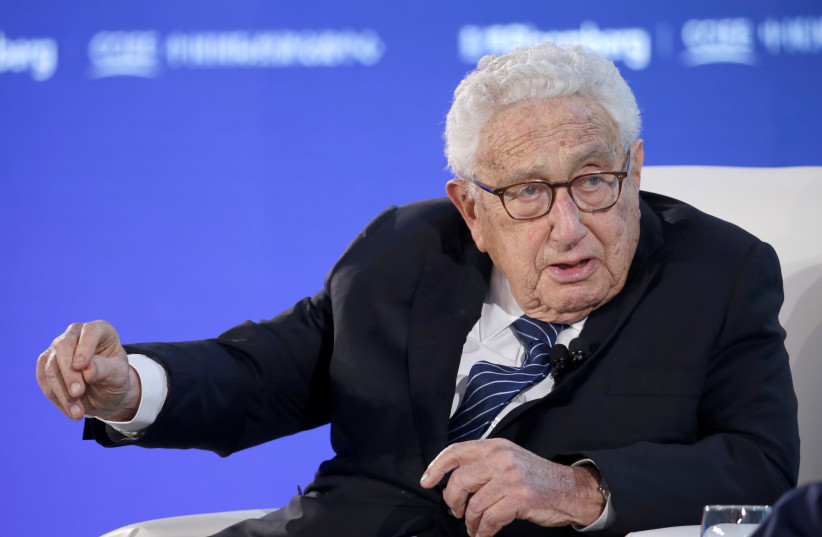Henry Kissinger, who died at his Connecticut home on Wednesday at the age of 100, was an iconic diplomat and a brilliant strategist who, as the first Jewish secretary of state in US history, made an indelible mark on the world – and Israel.
After fleeing Nazi Germany with his family to New York in 1938, Kissinger served in the administrations of Richard Nixon and Gerald Ford, first as national security adviser and later as secretary of state.
He masterminded US foreign policy in the 1970s, earning a Nobel Peace Prize for negotiating the end of the conflict in Vietnam, opening up relations with China, and engaging in détente with the Soviet Union. Still, some accused him of being responsible, inter alia, for the deaths of thousands of civilians in the US bombing of Cambodia.
During the Yom Kippur War, he played a key role in the cessation of hostilities, an effort for which he was credited with pioneering “shuttle diplomacy” between warring parties. Two years after the war, Kissinger pressed Ford to conduct a “reassessment” on Israel as a result of its refusal to withdraw from Sinai – which triggered a crisis in bilateral relations but ultimately yielded an Israeli-Egyptian peace treaty.
President Isaac Herzog called Kissinger “a Jewish teenager who fled the Nazis and went on to become a giant who shaped world politics with his own hands and mind.... The entire family of nations is blessed to this day by the fruits of the historic processes he led, including the laying of the foundations for Israel’s peace agreement with Egypt. In our last conversation, in which I congratulated him on his birthday, he told me: ‘Remember, I have always loved and supported Israel, and always will.’”

Kissinger defended Israel even more after he left office
Kissinger celebrated his 100th birthday in June with a party at the New York Public Library featuring VIPs from throughout his long career, including the current Secretary of State, Antony Blinken, who is also Jewish.
Speaking after a meeting at the President’s Residence with Herzog on Thursday, Blinken said: “Secretary Kissinger really set the standard for everyone who followed in this job. I was very privileged to get his counsel many times, including as recently as about a month ago. He was extraordinarily generous with his wisdom, with his advice. Few people were better students of history – even fewer people did more to shape history – than Henry Kissinger.”
Prime Minister Benjamin Netanyahu, who last met Kissinger two months ago in New York, recalled: “Each meeting with him was not just a lesson in diplomacy but also a masterclass in statesmanship. His understanding of the complexities of international relations and his unique insights into the challenges facing our world were unparalleled.”
World Jewish Congress President Ronald S. Lauder said the WJC was deeply saddened by the passing of “a towering figure who represented the best of the World War II generation.”
Noting that Kissinger, a longtime supporter of the WJC, had been honored with its Theodor Herzl Award in 2014, Lauder said: “We mourn the loss of a statesman whose wisdom and friendship were a beacon of light. Dr. Kissinger’s passing leaves a void in our world that will be profoundly felt.”
After leaving office in 1977, Kissinger became more outspoken in favor of Israel, publicly declaring in a speech that year: “The security of Israel is a moral imperative for all free peoples.”
In the decades that followed, he publicly defended Israeli interests, arguing that the lack of Middle East peace was the product of Arab intransigence and voicing skepticism over international efforts to strike a nuclear deal with Iran.
In 2012, after Kissinger received the Presidential Medal of Honor – Israel’s highest civilian honor – from then-president Shimon Peres, he said, with emotion: “My parents would be more proud of this honor than any other distinctions that have come my way.”
In a recent interview with Germany’s WELT TV, Kissinger said that it was “painful” to see Arabs in Berlin celebrating the Hamas assault on Israel. The real goal of Hamas and its supporters “can only be to mobilize the Arab world against Israel and to get off the track of peaceful negotiations,” he said.
We pay tribute to Kissinger and salute him for standing with Israel – when it counted most.
